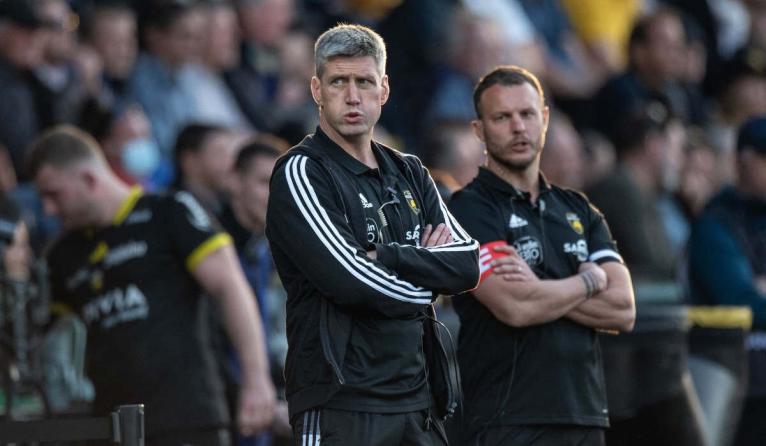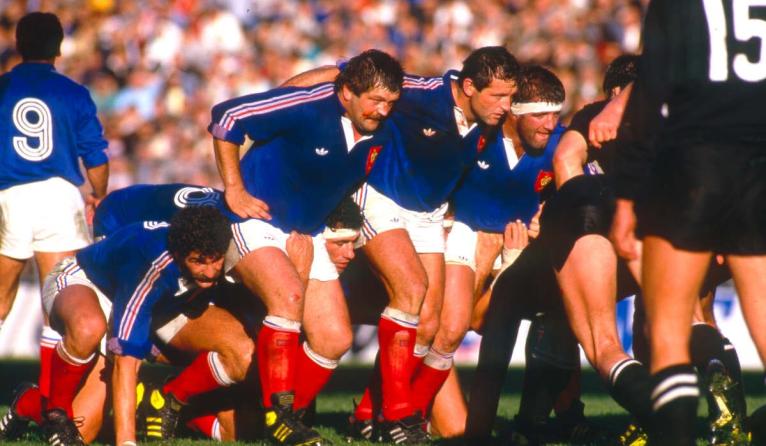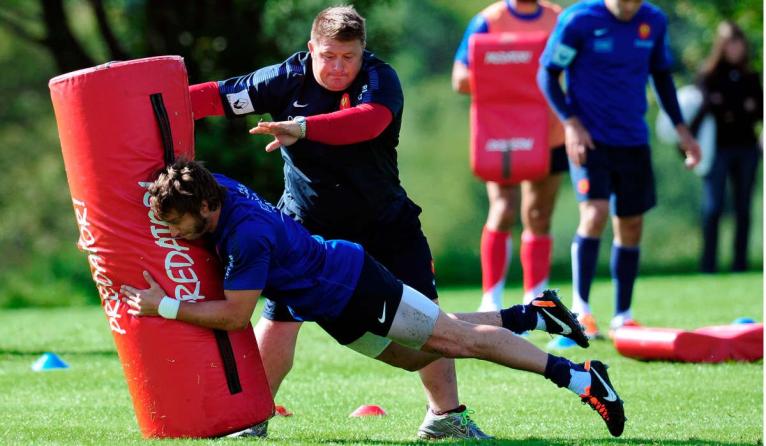While Alex Ferguson was in the habit of giving his players the hair-dryer treatment during his half-time team talks if they weren’t playing well, Patrice Collazo’s weapon of choice was an ice bucket.
He famously kicked one, very hard, during a half-time rant when his La Rochelle side were trailing Gloucester 22-7 in a 2016-17 European Challenge Cup tie. Not that it did his players – not to mention the bucket – much good as they went on to lose 35-14 to the Cherry and Whites.
Collazo left La Rochelle in 2018, heading to bigger and better things – or so he thought – at Toulon. But his three years on the Cote d’Azur were a calamity and he was forced out in October last year. His replacement, Franck Azema, has transformed Toulon’s fortunes in barely six months and this weekend they contest the European Challenge Cup against Lyon.
Before Collazo’s time at Toulon was cut short there were rumours in the French media of altercations with players and even the president, Bernard Lemaitre, which although denied did nothing to dispel the image of a man temperamentally unsuited to coaching at the top level.
The Champions Cup, meanwhile, features another of Collazo’s former clubs, La Rochelle, who have reached European’s showpiece final for a second successive season. Of course, Collazo might argue that he had laid solid foundations at both clubs on which the subsequent success was built; his critics would counter that the building blocks were already in place and he was incapable of creating anything meaningful.
A pattern has begun to emerge in French rugby in recent seasons in which the winning clubs are coached by former backs, and not burly former forwards, as was the case a couple of decades ago.
Take the three French clubs in this weekend’s European finals: Azema, Ronan O’Gara of La Rochelle and Pierre Mignoni of Lyon. Then there are last season’s double winners, Toulouse, whose coach Ugo Mola was once one of their threequarters. This season’s Top 14 leaders are Montpellier, coached by Philippe Saint-Andre, and of course the national team have been rejuvenated under the guile of Fabien Galthie.

In my time I’ve interviewed Saint-Andre, Azema and Mignoni, a trio of studious men who are also perceptive and broad-minded, and think deeply about the game. I’m sure there have been times when they’ve spoken some harsh home truths in the dressing room but as far as I’m aware they have never assaulted an ice bucket.
The same couldn’t be said of my former coach in amateur French rugby, a former hooker, whose idea of a pre-match team talk involved slapping and punching his players. I recall one match, a local derby, when a mass brawl broke out and he charged onto the pitch to plant a haymaker on their fly-half.
I recounted this tale a few years ago to Gregor Townsend, for an article I was researching for a British newspaper about the pleasure and pain of playing rugby in France. It prompted Townsend to reminisce about his own experience. ‘I first went to France in 1998 when I signed for Brive and Laurent Seigne was coach,’ he told me. ‘He would be fighting his own forwards in the dressing room before matches. My warm-up routine usually consisted of a couple of hamstring stretches so I just hid in the corner.’
Laurent Seigne’s time coaching France was cut short after he spat in the face of New Zealand referee David Bishop at the end of the 1991 World Cup quarter-final defeat to England
The season before Townsend arrived in France, there had been the infamous battle of Brive, when on-field fighting against Pontypridd in a Heineken Cup fixture spilled over into a wild-west brawl in a town bar in the evening. Seigne wasn’t involved in the violence but his persona was very much no-nonsense and undoubtedly pervaded the dressing room.
Seigne won fifteen caps for France as a prop, some of them when Daniel Dubroca was coach in 1990 and 1991. He was also a former front-rower, a hooker in his case, but his time coaching France was cut short after he spat in the face of New Zealand referee David Bishop at the end of the 1991 World Cup quarter-final defeat to England. For good measure, Dubroca also called the Kiwi a ‘cheat’. He resigned six days later, blaming the British media for his downfall rather than his potty mouth.

That 1991 quarter-final remains one of the most violent internationals ever witnessed. Writing in the Irish Independent, Michael Calvin said: ‘The conventions of civilised behaviour afforded England’s rugby players no protection at the Parc Des Princes. Eyes were gouged, defenceless men were kicked in the head, and a mugger’s mentality infected international sport.’
For many years, a generation, Dubroca embodied the ideal of what a French coach should be. A former forward, a hard, grizzled man, who wore his heart on the sleeve: Seigne, Collazo, Laurent Rodriguez, Jacques Delmas, Pascal Peyron, Olivier Saïsset and the Lièvremont brothers, Thomas and Marc.
The Frenchman responsible for this shift in thinking was Didier Retière, ironically, a forward in his undistinguished player days when he was appointed the FFR’s national technical director
As other nations hired men who prided themselves on their intellectual approach to coaching, encompassing psychology as much as tactics and technique – the likes of Kitch Christie, Ian McGeechan, Laurie Mains, Bob Dwyer and Geoff Cooke – France lagged years behind. Like English football clubs, there was a belief that the only qualification a coach/manager required was to have played the sport at a very high level.
It wasn’t until a decade ago that France began to understand that modern rugby required a cerebral understanding of the game; well organised defences were not going to be broken down by brawn alone. Brainpower was needed to outwit the opposition.
The Frenchman responsible for this shift in thinking was Didier Retière, ironically, a forward in his undistinguished player days. He had been the France U20 coach under Fabien Pelous in 2012-13 but remained just a season before, in 2014, he was appointed the FFR’s national technical director.

Retière recognised that coaching at all levels in France was outdated. Too many coaches and directors of rugby were being hired on their reputation as players; Pelous, Thomas Lièvremont (who succeeded Pelous as manager of the Under 20) and Olivier Magne, who replaced Retière as the U20 forwards’ coach.
Retière began to search for men who, like him, might not have enjoyed successful playing careers but who nevertheless possessed the intellectual qualities to coach. One of the first he found was Sébastien Piqueronies. A talented junior centre at Clermont, where he had played in the same academy side as Aurélien Rougerie, Piqueronies’ career was curtailed by injury. He trained as a PE teacher, a foundation stone of many a superb coach, including Carwyn James, John Dawes, McGeechan, Graham Henry and Phil Larder. In 2015 Piqueronies was appointed coach of the France U17 squad.
The day that Patrice Collazo lost his cool in the La Rochelle dressing room was symbolic. Tirades and tantrums are passé in the professional game
Three years later Piqueronies took charge of the France U20 team, and in his first season he guided them to their first world title at that age-group, a feat they repeated in 2019. Asked in an interview the secret to his success, Piqueronies replied: ‘I’m part of a pretty well-oiled system. I work in concertation with the clubs, the technical staff…a style that allies aggressivity, in the French tradition of a strong forward game, with speed from the off and intelligence in decision-making.’
The emergence of Piqueronies coincided with the flowering as top-class coaches of O’Gara, Mignoni, Ugo Mola, Jean–Baptiste Élissalde, Gonzalo Quesada and Pierre-Henry Broncan, another run-of-the-mill back who has found his vocation as a coach, guiding Castres this season to a place in the Top 14 play-offs.
On reflection the day that Patrice Collazo lost his cool in the La Rochelle dressing room was symbolic. Tirades and tantrums are passé in the professional game; the sport is more cerebral and a coach who allows his emotion to get the better of reason will not be a success. You could even say that their careers will kick the bucket.



Comments
Join free and tell us what you really think!
Sign up for free